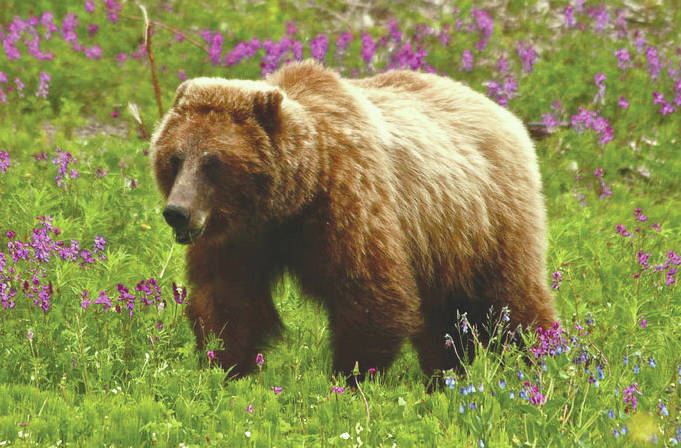Kenai’s Luke Baumer saw firsthand Thursday at Tsalteshi Trails behind Skyview Middle School that it’s time for Kenai Peninsula residents to be bear aware.
Baumer does fitness training at the Iron Asylum Gym on Kalifornsky Beach Road, but he hasn’t been in the gym since March 18, when Gov. Mike Dunleavy shut down gyms and fitness centers to slow or prevent the spread of the new coronavirus.
So at a time when he would normally be either working out or training a client, Baumer found himself sitting in the parking lot of Skyview with a friend.
The friend asked if that was a dog or a bear milling around in front of the big Tsalteshi Trails sign at the top of a hill near the school.
“‘That’s definitely a bear,’” Baumer said. “I got close enough where you could see with my phone that it was walking around the sign where it says Tsalteshi. It turned around and walked off into the woods.”
Baumer, also the head volleyball coach at Soldotna High School, let Sarge Truesdell, Skyview Middle School principal, know about the sighting. He also let the state troopers know. The video Baumer took and posted on Facebook quickly spread, getting reposted on the Tsalteshi Facebook site.
Baumer, 33, has spent nearly all of his life on the peninsula. He said it was neat to see a bear in the wild, but he also liked the way the community responded by spreading the word of a bear sighting in a popular recreation area like Tsalteshi.
“We take for granted how many things in this state we have available that nobody else does,” Baumer said. “The virus also has reminded us about taking for granted so many of the little things.
“At the same time you can’t go to the gym, you can go outside and find things to go do that allow you to reconnect with the reason you fell in love with Alaska in the first place.”
Jacob Pelham, a wildlife technician with the Alaska Department of Fish and Game in Soldotna, said Baumer did the right thing by alerting the public to the bear at Tsalteshi. Pelham said the public is always welcome to give Fish and Game a call about bear sightings, particularly in high-use areas.
“Even if people never see bears, they have to keep in mind that bears are around,” Pelham said. “If you walk every day and see signs that a bear is in your area, maybe you’ll go ahead and grab a can of bear spray for good measure, rather than getting complacent and deciding not to grab it.”
Pelham said a bear sighting like the one at Tsalteshi is a good reminder and nothing to get scared about.
“Bears are up and running around,” Pelham said. “We live in Alaska, especially the peninsula where there’s a high density of people, moose and bears. The key is having an understanding that at any moment you could come across one of those animals.
“The key is knowing what to do, staying calm and staying alert.”
Pelham said Fish and Game will get reports of bears year-round, but those reports have picked up in the last month with the advent of warmer weather.
That means it’s time to take any trash that’s outdoors and put it in a bear-resistant storage shed or trash can. Any freezers or refrigerators that are outside should be put away or secured with electric fencing. The same thing goes for beehives, smokers, livestock and bird-feeding stations.
“Bears that are coming out of hibernation are becoming more active looking for food,” Pelham said. “Walking around and looking for food when hungry makes anything more cranky.”
When in the woods, Pelham recommends carrying a gun or bear spray, hiking in groups, leashing dogs, and having bells or announcing your presence.
The Fish and Game website, adfg.alaska.gov, has plenty of resources on bear safety. Just search for “bear safety” on the website.
Pelham had planned to team with Defenders of Wildlife, a nonprofit conservation organization, to put on bear safety workshops in March, but those didn’t happen due to the emergence of the new coronavirus pandemic. Pelham does remind the public that Defenders of Wildlife has a grant program for electric fencing. More can be learned about the program by contacting Fish and Game at 907-262-9368 or Defenders of Wildlife.
In addition to bears, Pelham said moose also are cranky toward the end of winter because trees haven’t started budding and they are hungry. Fish and Game is still getting reports of winter-kill moose.
Moose cows also will begin dropping their calves any moment, with a report of calves down in Homer already in.
“People just need to be giving moose the space they are always giving moose,” Pelham said.
He said people should be aware moose will sometimes abandon calves for a time period with the intention of coming back, so people should not approach that calf assuming it has been abandoned. Wait for a time period for the mother to return, and if the mother doesn’t, give Fish and Game a call.
Finally, Pelham said Fish and Game’s office on Kalifornsky Beach Road is still open to the public during this time of social distancing. Fish and Game does ask that all business, if possible, be carried out over the phone or online.
For processes that require personal interaction, like animal sealing after a successful hunt, Pelham requests that the hunter call ahead to make an appointment to make sure multiple people are not showing up at the office at once.

